A recent Society for Human Resource Management (SHRM) research finding revealed that 79% of HR professionals say that scores on skills assessments are just as, or more important than, traditional criteria in hiring decisions.
The same research uncovered that a huge percentage of organizations across every industry say their hires have improved due to the use of skills assessments, 78%, in fact.
What does this mean? It means that if your focus isn’t on skills-based hiring practices, you’re falling behind. Findings point to the fact that competency requirements make hires that are better fitted to open positions.
What is skills-based hiring?
Skills-based hiring is a way to recruit candidates based on their skill set rather than their educational background. As a result, it promises more qualified candidates, more diversity and, in many instances, a fairer hiring process.
In its simplest form, skills-based hiring is finding candidates whose specific skills align with the job in question.
While skills-based hiring is currently popular and trending, the concept isn’t new, it’s just come back around, rebounding with the pandemic. People had always been hiring based on skills until a trend that surfaced decades ago, called degree inflation, took hold. Degree inflation became popular with employers, and with more people having college degrees, the trend inflated the importance of a degree for mid-level positions.
It refers to the convention of requiring job candidates to possess a college degree when the job type did not traditionally require a four-year degree. The employer-driven market of the past few decades gave recruiters the luxury of narrowing the playing field by requiring candidates to require a four-year college degree.
But degree inflation hasn’t been a great success. In fact, a Harvard Business School study claims that it has made the US labor market more inefficient with more unnecessary degree requirements.
However, the rising cost of higher education combined with the pandemic and an already weakening degree inflation trend made degrees less attractive and less attainable.
Pummeled by the Covid-19 pandemic, universities and college campuses scaled back and went online with remote learning. Students and their benefactors were less than satisfied with shelling out top dollar for online classes, though, and higher education took a hit.
Instead, candidates resorted to more unconventional learning and education, looking to online courses and certificates to upskill, re-skill and learn new skills. The pandemic brought about a shift to a candidate-driven market with job descriptions focussing more on candidate skills.
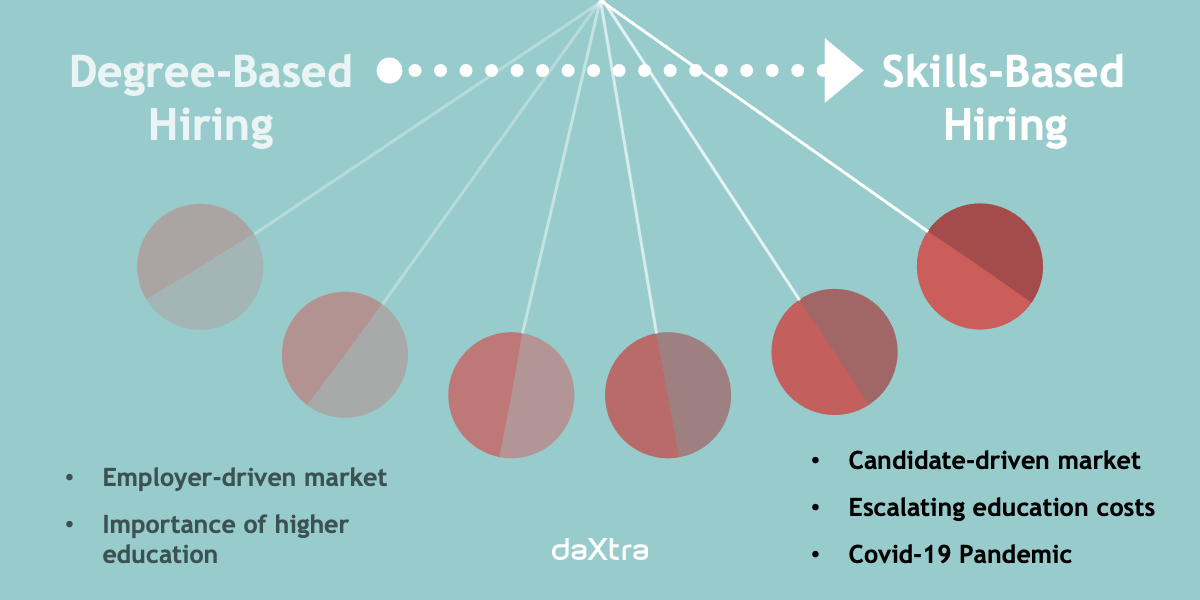
Now the pendulum has swung back to the concept of skills-based hiring — the more traditional hiring method based on hiring someone whose skills match the position requirements, regardless of a higher education degree.
Of course, there will always be degree requirements for certain professions, but many employers are now realizing that with upskilling, reskilling, and/or relevant experience, they can find well-qualified candidates for middle-skills jobs and even some entry-level positions.
Employers are resetting degree requirements. A recent study by Harvard Business Review and Burning Glass shows that a growing number of companies are dropping the requirement for a bachelor’s degree for both middle-skill and higher-skill roles.
The tech industry has been extremely impacted, with giants like Google, GM and Bank of America, ditching degree requirements and adopting skills-based hiring in a refocused effort to attain new talent, says a Computer World news analysis.
What are the benefits of skills-based hiring?
Skills-based hiring is efficient because it allows you to focus your time and resources on candidates who are a good fit for the job rather than wasting time and money interviewing people who aren't - allowing you to have a more diverse talent pool full of qualified candidates.
It's more effective because it helps you avoid hiring someone who doesn't have the skills necessary to succeed in their role and stay with a company long-term.
Several notable benefits of skills-based hiring are:
- Faster time to hire
- More diverse talent pools
- Best fit for open positions
- Better employee retention rates
Faster time to hire
Better response rates equal faster hires. With more talent and qualified candidates to choose from, hires will be quicker. A 4-year degree requirement only adds another qualification to screen through so takes extra time. And, it generally takes longer to field and screen degree-holding candidates, before getting to the skills assessments.
Skills-based hiring can help you close the talent gap faster by shortening the time to hire and keeping hiring costs low while helping you concentrate on applicants’ skills first.
Using an AI-powered sourcing tool makes it faster and easier to find talent with skills matching open positions. This assures you a much quicker sourcing time and ultimately a faster time-to-hire.
More diverse talent pools
The cost of higher education has led to minorities having fewer four-year degrees. The Washington Post reports that more than 62% of American workers over the age of 25 do not hold a four-year degree. The number increases to 72% for Black adults and 79% for Hispanic adults. Not everyone has the privilege of attending traditional four-year colleges or gaining further formal education.
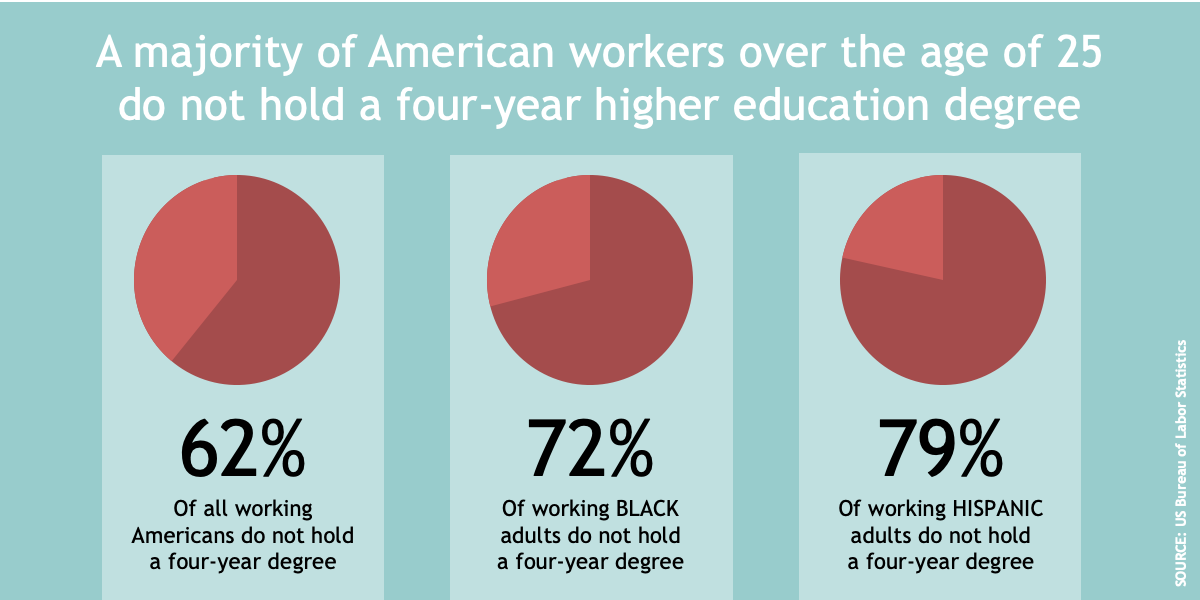
Take away the barrier of a degree requirement, and skills-based hiring opens the door for those people, minorities included, who are skilled without a degree.
A LinkedIn report shows that to apply for a job, women feel they need to meet 100% of the criteria on a job post, while men usually apply after meeting about 60%.
Relaxing and rewording the requirements of a job description may help level this playing field and broaden the diversity and inclusion in talent pools.
Skills-based hiring gives an equal opportunity to all potential candidates – college degree or not.
More suitable candidates
In the candidate-driven market, there isn't a good reason for companies to require a 4-year degree when you can match hard and soft skills through assessments. After all, a degree is only a representation of the skills they might possess.
If you hire based on skill, you have the potential to pinpoint the exact fit for a position. If you have A, B and C skills, then you should fit the role that requires A, B and C.
Entrepreneur.com said it best, "regardless of an applicant's education; there is no guarantee that someone who has graduated from college will succeed in the business world." But matching skill for skill can make the right fit to succeed in the role.
Increased employee retention rates
LinkedIn data found that employees without a traditional four-year degree stay at companies 34% longer than those with such a degree.
It’s safe to say that you will gain better retention rates through skills-based hiring. Some of the factors contributing to this are that with better fits come more job satisfaction and thus happier people. People who are happy with their jobs tend to stay.
How do you adopt skills-based hiring practices?
How do you shake the old practice of requiring a four-year degree and move into a skills-based hiring mode? Shifting into new ways of thinking and hiring can have initial challenges, but focus on these three things to move forward:
- Job descriptions
- Skills-based sourcing tools
- Skill assessments
Job descriptions
Begin with job descriptions. Review and re-evaluate the requirements that new hires would require for specific roles. Place your focus on skills that are necessary for the job. Think about the words you use. You are liable to get more responses by calling attention to the responsibilities of the position rather than the requirements. In fact, recent LinkedIn research reveals that job posts highlighting “responsibilities” instead of “requirements” get 14% more applications per view.
Sourcing tools
Invest in recruitment automation software that sources and ranks by skill. Consider a solution like Daxtra Search Nexus that identifies the top skills of each candidate, shortlists and comparatively ranks candidates against each other. It indexes the candidate records and applies intelligent "natural language" ranking based on a candidate's skills within context, so it ranks the results like a human would, only faster and with fewer errors.
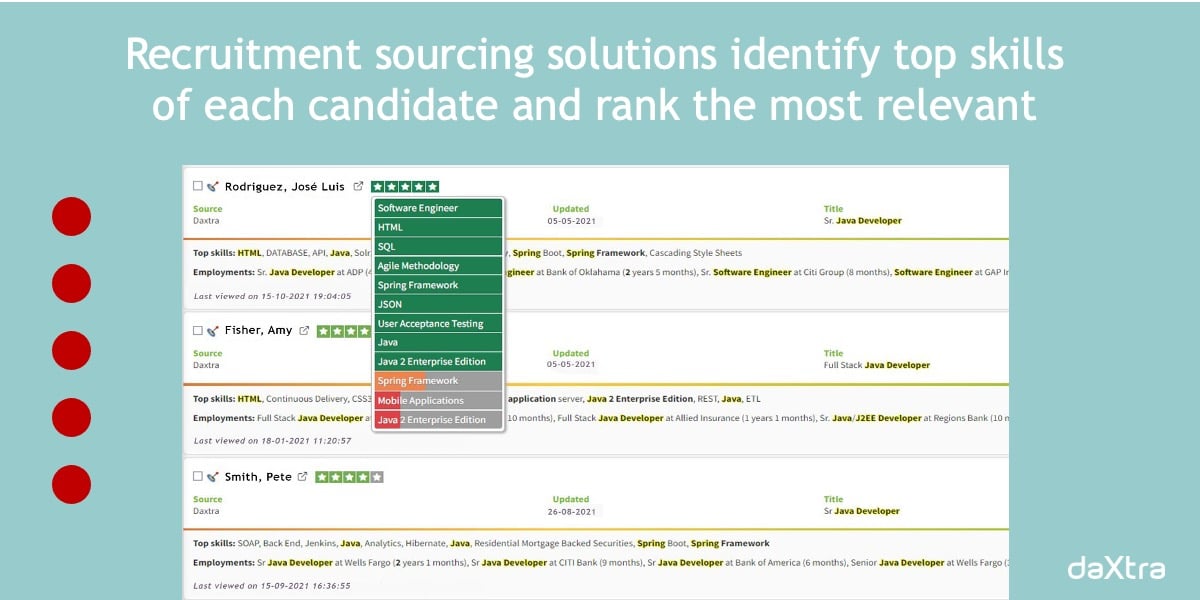
Skills assessments
Without a degree, which in theory proves qualification, how can you trust that the candidate is as skilled as they say they are? The answer is skills assessments. There is a myriad of these assessment tools out there, but do yourself a favor and search out solutions that provide data and real research behind their processes and assessment creation.
These assessments will help you gauge the abilities and skills of job applicants and help identify the individuals who have the necessary skills for the job while weeding out others.
Types of assessments include:
- Hard skills assessment – tests on skill proficiency
- Work sample test – tests on actual duties related to the position
- Cognitive ability test – tests performance levels and mental ability in different situations under various conditions
- Personality test – identifies and tests on traits best fit for specific roles, also culture fit
- A combination of the above
A bit of work and consideration must go into choosing assessment tools. This is determined by your goals, what skills you want to measure and the characteristics of your ideal assessment. With this in mind, plan on researching the market for what you are looking for.
What does a skills-based hiring job post look like?
A good job description or job posting is vital to the candidate sourcing and hiring process. It is used to communicate clearly and concisely what the open position entails. For competency or skills-based hiring, HR experts recommend rewriting job descriptions that place a focus on skills, competencies and merits and doing away with strict requirements and qualifications.
Questions to consider when writing a job description/posting:
- What are the expectations for the position?
- What are the areas of knowledge and expertise the position entails?
- What are the basic skills needed?
- Which skills are required and which are preferred or desired?
- What results are you looking for?
- What might be a blue-sky skill (not a necessary skill, but "it might be great if you had this skill")
Consider the day-to-day processes and responsibilities of the job opening. Get a good idea from people who are familiar with the opening and what is required to be successful at the job. Then write a list of hard and soft skills necessary. You may include proficiency level as well, especially for software knowledge. Include the general job description and company profile, and culture statement.
Think about the ideal candidate and consider throwing in a blue sky or extra credit skill, “it’s not required, but it would be great if you also had this skill.” Who knows? You might find your purple squirrel with a request like this!
Work hard at substituting things like “responsibilities” for “requirements” and “qualifications desired” for “qualifications necessary.”
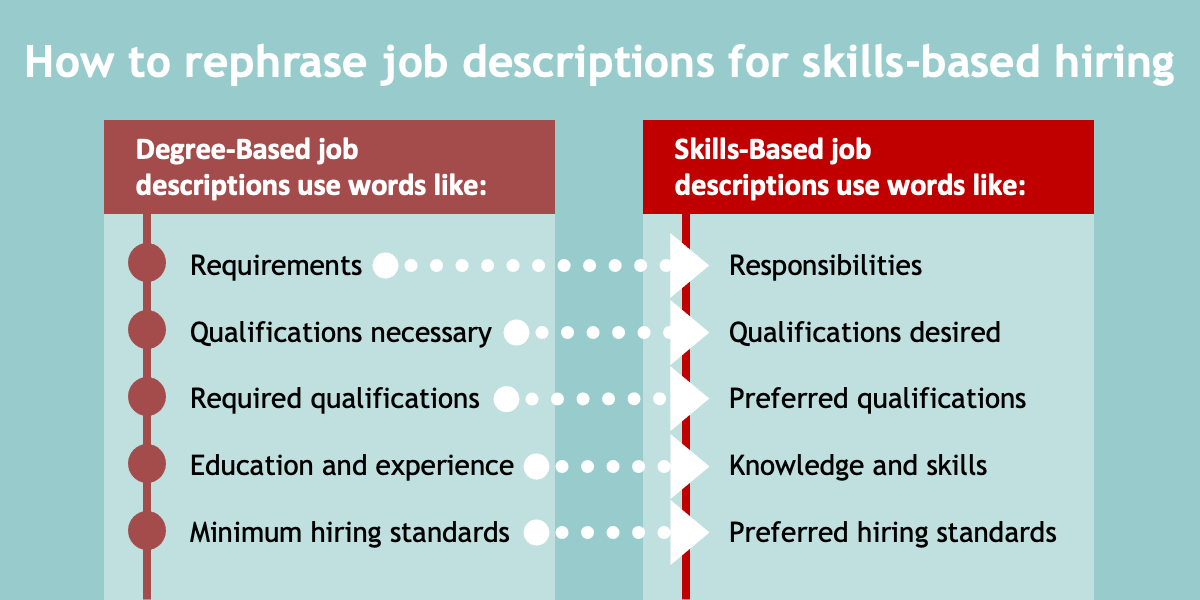
With all of this information in mind, you end up saving a lot of valuable time when you create best practices for writing job descriptions. A tic-list of skills that you can check off with each candidate helps identify a better fit for the job. Even better is sourcing software that can do this for you in the form of identifying and ranking candidates.
Make the most of skills-based hiring
For far too long, recruiters have been missing out on qualified candidates who were right under their noses. Why? Because degree inflation had taken off, requiring degrees where degrees weren't really needed.
Meanwhile, a LinkedIn report sees a 21% increase over the past year in job postings in the U.S. that advertise skills and responsibilities instead of qualifications and requirements and the number of positions that don't require a college degree increased by nearly 40% from 2019 to 2020."
Many companies find that by opening up their search, they can tap into a wide pool of overlooked skilled talent. Moving back to a more accurate qualification process, recruiting professionals have begun to focus again on the skills candidates possess rather than if a candidate holds a degree. This new-again practice, called skills-based hiring, is taking off, giving skilled candidates a chance at success and providing companies with more diverse talent who are better suited for their jobs and remain loyal, boosting retention rates.
One of the biggest benefits of skills-based hiring is that it's more accurate. With traditional hiring, you're looking for candidates who have a predetermined level of experience and education. However, these requirements often mean that you miss out on qualified candidates with different levels or types of experience. With skills-based hiring, there are no requirements - instead, you can hire anyone with the right skillset who applies to your position.
Another advantage to choosing this method is that it will allow you access to a wider pool of talent than ever before. Traditional hiring processes excluded people based on their race, gender and other factors that may not have anything to do with their ability to do the job well (or at all).
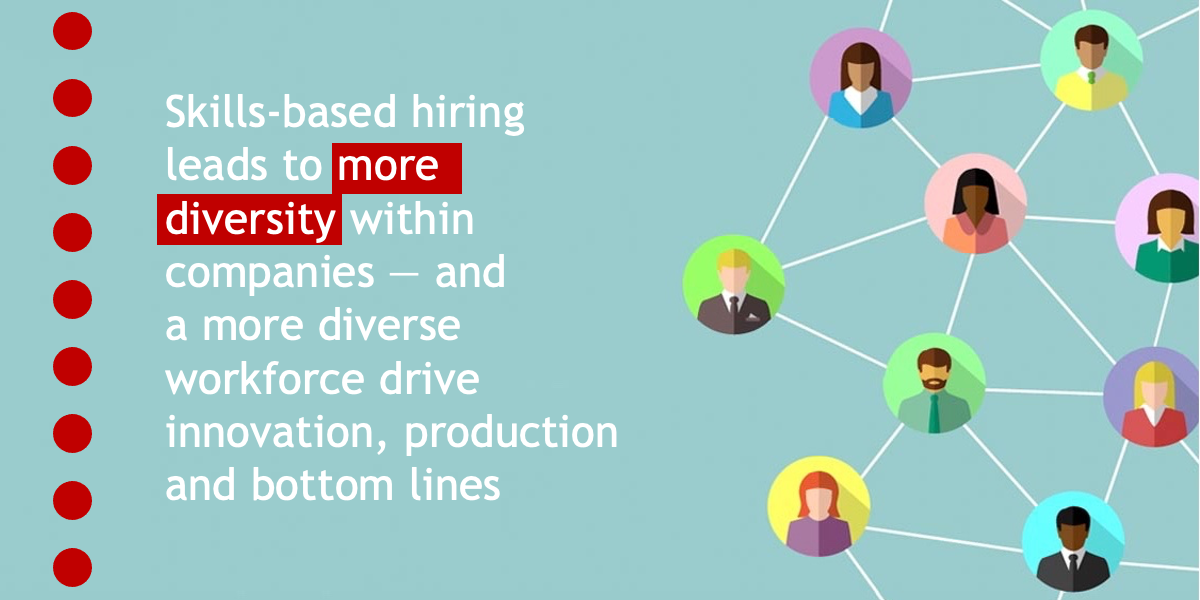
Skills-based hiring leads to more diversity within companies, and a more diverse workforce drives innovation, production and bottom lines. A system based on hiring by skill allows everyone who meets certain qualifications an equal chance at being considered for employment. Meaning qualified, diverse and underrepresented minorities will be able to apply without worrying about being overlooked because they don't fit into some arbitrary profile or stereotype about what an ideal candidate looks like. A diverse workforce is good for business.
By taking advantage of tools and implementing skills-based hiring processes, companies can find more qualified candidates who are better suited to their roles, therefore happier, more productive and loyal – meaning longer retention rates. This approach also has the potential to increase diversity in hiring, as well as save time and money by eliminating unqualified applicants.
For more on skills-based hiring read our blog article: Why skills-based hiring is relevant now more than ever.



